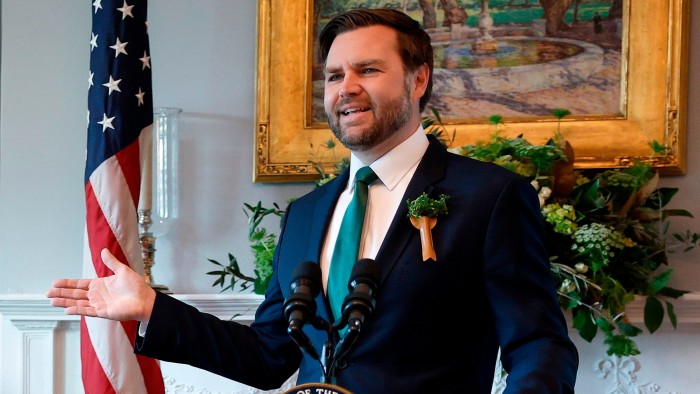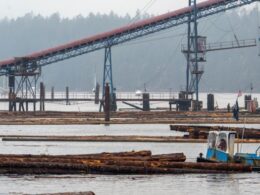Unlock the White House Watch newsletter for free
Your guide to what Trump’s second term means for Washington, business and the world
The US celebrates the 250th anniversary of its independence from Britain next year and Northern Ireland wants pride of place at the party.
From Charles Thomson, the founding father who designed the Great Seal of the United States, to vice-president JD Vance, a self-proclaimed “Scots-Irish hillbilly at heart”, Americans who trace their lineage to Northern Ireland have helped shape the world’s most powerful nation.
Politicians, cultural and business leaders in Northern Ireland believe it is now time for that shared heritage to receive greater recognition. Communities minister Gordon Lyons says he has secured a deal granting the region “special status” at the June 2026 commemorations — through cultural exchanges and events.
Historically, Northern Ireland’s influence on America has played second fiddle to that of émigrés from what is now the Republic of Ireland, including the likes of Walt Disney and Henry Ford. Nearly 2mn people fled to the US amid Ireland’s 19th-century famine. Their descendants, who call themselves Irish-Americans, estimate their number at around 31mn.
By contrast, only 2.6mn call themselves “Scotch-Irish”. But their heritage is impressive: over a third of US presidents trace their roots to the province of Ulster in the north of the island and its 17th and 18th century emigration of Presbyterians, themselves of Scottish origin.
According to Dublin’s emigration museum, Epic, those 18 US presidents include William McKinley, the “tariff-king”, who is President Donald Trump’s idol.
Vance’s forebears were among those emigrating from the nine counties of Ulster. Six of those counties were partitioned in 1921 to form Northern Ireland, which was expected to have a permanent Protestant majority.
Some historians believe the very term hillbilly, the title of Vance’s memoir about his childhood in Appalachia, comes from “Billy Boy” — a term for followers of the Protestant King William III, who is revered by pro-UK unionists in Northern Ireland. The Appalachian mountains where Vance grew up are even part of an ancient geological formation that also crosses Northern Ireland.
Within the US, the tale of the Irish who sailed to America and seeded a great diaspora is a great story, says Liam Kennedy, director of the Clinton Institute for American Studies at University College Dublin. “But there are others. I think that the Ulster-American story is one that needs to be heard more broadly.”
“We should have ringside seats,” says Stephen McCracken, a local Northern Irish historian who has followed the region’s forebears’ extensive links with the declaration of independence and since. “If it wasn’t for us there would have been no independence victory for the USA in 1776, it’s just a fact.”
Sharing in America’s celebrations could help lift Northern Ireland’s spirits. Three decades of the “Troubles” conflict involving republican paramilitaries fighting to reunite Ireland, loyalists determined to stay in the UK and British security forces have left a legacy of social problems.
While the Republic has bumper budget surpluses, Northern Ireland — once a shipbuilding and linen-producing powerhouse — has crumbling public services, a struggling health system and no prospect of more funding from the UK’s cash-strapped government.
Like post-industrial Appalachia, parts of Northern Ireland have high levels of deprivation. Official data shows 14 per cent of working-age adults and a fifth of children in the region live in absolute poverty.
There is also an internal divide. Working-class Protestant boys — the distant cousins of Vance’s hillbillies — suffer persistent educational underachievement compared with Catholics. “I’ve had 16-year-olds who can’t read or write — and they have been attending school for 12 years,” says Emma Shaw, who runs the Phoenix Education Centre.
Some worry that taking part in America250 celebrations might exacerbate division. Kennedy wants recognition for US/Northern Irish heritage but he sees risks too. “The 250th celebration — to the degree that it is run by Trump — will be a jingoistic shit-show.”
Source link









